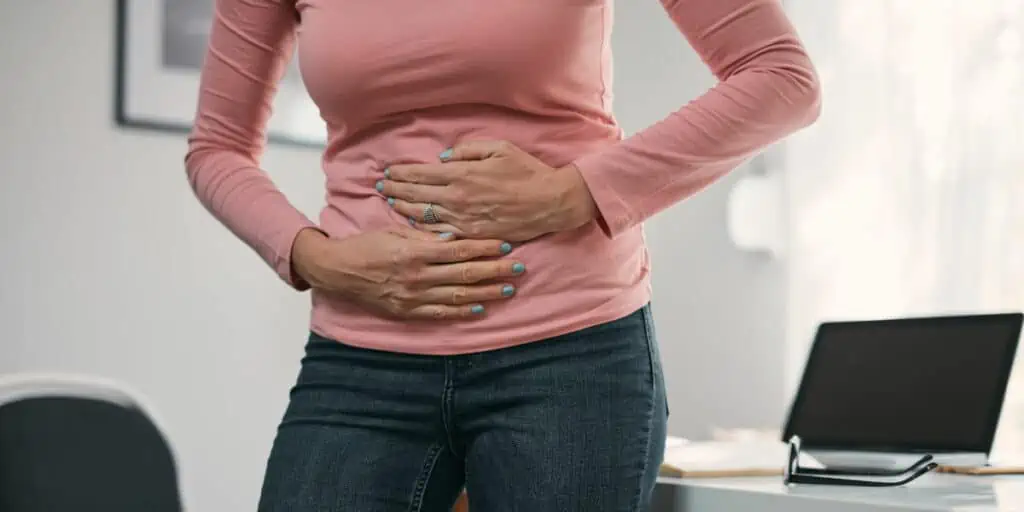One-in-ten women in the U.S. experience endometriosis, yet it still takes multiple years (an average of 10 years!) to receive an endometriosis diagnosis. This makes me angry every time I think about it.
Endometriosis is a condition in which endometrium tissue — tissue like that that lines the uterus — grows outside of the uterus. It can cause chronic pelvic pain, heavy bleeding, and pain during sex, but can also cause fertility issues for patients trying to conceive. Giddy consulted with me for their article on who is most at risk of endometriosis. Here are some excerpts from that article.

Who Is Most at Risk of Endometriosis?
Endometriosis mostly affects women ages 15 to 49 but also can affect men, though not with any frequency.
In rare cases—16 documented cases to be exact—endometriosis has been diagnosed in cisgender men, according to a 2018 report in the journal Case Reports in Obstetrics and Gynecology. In these situations, the cause is thought to be exposure to estrogen. While uncommon for men, estrogen therapy is sometimes used to treat prostate cancer and improve testosterone deficiency.
Much more common is endometriosis in women.
“Endometriosis affects 10 to 15 percent of women in their reproductive age,” said Thais Aliabadi, M.D., a board-certified OB-GYN in Beverly Hills, California, and the founder of the weight-loss practice Trimly.
The condition does not discriminate and has no racial predisposition, according to Dawn K. George, M.D., a board-certified OB-GYN at MOMZ Ob/Gyn in Homestead, Florida.
While there is some familial association, George added that there is no known genetic link like there may be with conditions such as cystic fibrosis or sickle cell anemia. She called it a polygenic-multifactorial mechanism. Multifactorial inheritance refers to traits caused by a mixture of inherited, environmental and unknown factors.
It all means the exact cause of endometriosis is unknown.
Even so, first-degree relatives of women with endometriosis have a five- to sevenfold increased risk of diagnosis, Aliabadi said. Women whose family members have been diagnosed with endometriosis should get evaluated by their OB-GYN.
Women who have never given birth are also at a higher risk for endometriosis. When a woman is pregnant, her menstrual cycle stops and she’s exposed to less estrogen for that time. Lower levels of estrogen lower the risk for endometriosis, as endometrium-like tissue needs estrogen to grow.
This is why women who go through menopause are no longer at risk for the condition, unless they are taking estrogen supplements.
“Other risk factors are early onset of menses, shorter menstrual cycles, heavy bleeding, autoimmune disease and smoking,” Aliabadi said. “Additionally, women who have certain genetic mutations or immune system disorders may be at an increased risk for endometriosis. However, it is important to note that anyone who has menstruation can develop endometriosis.”
When to see a doctor
If you are experiencing symptoms or are concerned about your risk for endometriosis, you should schedule an appointment with your doctor.
“Painful periods are not normal,” Aliabadi emphasized. “If you have painful periods, heavy periods or experience pain during sex, you should see your gynecologist to get tested for endometriosis. Your doctor will help manage your pain and will help guide you on how to alleviate the pain or get pregnant if growing a family is something you look forward to in the future.”
The timing for evaluation is important, George added. Most adolescents and women experience cramping, which is usually responsive to over-the-counter pain medications.
“For those who do not see an improvement of pain with NSAIDs/OCPs within three to six months or those with dyspareunia [painful sex], evaluation is warranted, especially for those women with first-degree relatives with documented endometriosis,” she said. NSAIDs are nonsteroidal anti-inflammatory drugs, and OCPs are oral contraceptive pills.
There are some comorbidities to be aware of, too.
“If you have been diagnosed with PCOS [polycystic ovary syndrome], there’s a good chance that you may also have endometriosis,” Aliabadi said. “Please make an appointment to see an experienced gynecologist. Women don’t need to live with this type of pain. There is help out there.”
Read the rest of this article at getmegiddy.com.
Looking for a new OB/GYN? Talk to Dr. Aliabadi
Dr. Thais Aliabadi is frequently called upon to provide her expert opinion on womens’ health issues. Dr. Aliabadi and her team provide the best medical care and support to patients dealing with PCOS and endometriosis, planning to expand their family, or just anyone seeking OB/GYN care.
We invite you to establish care with Dr. Aliabadi. Please make an appointment online or call us at (844) 863-6700.
The practice of Dr. Thais Aliabadi and the Outpatient Hysterectomy Center is conveniently located for patients throughout Southern California and the Los Angeles area. We are near Beverly Hills, West Hollywood, Santa Monica, West Los Angeles, Culver City, Hollywood, Venice, Marina del Rey, Malibu, Manhattan Beach, and Downtown Los Angeles.















